The Impact of ISO 27701 on Business Growth
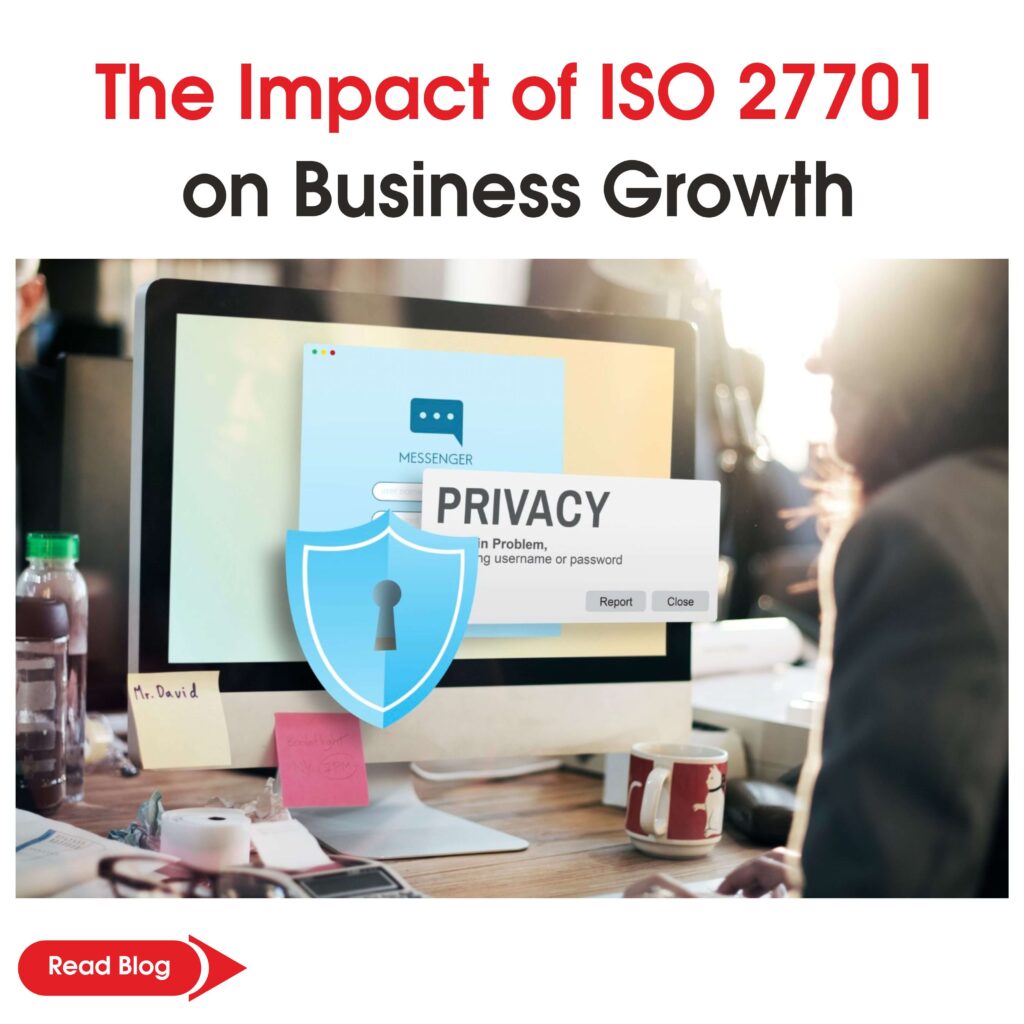
Today’s business environment cannot be overemphasized without a consideration of privacy and data protection. This is especially due to the growing importance of data privacy and regulations across the world hence the need for organizations to fully embrace proper data management. Such a framework that has emerged and has received popularity in the recent past is the ISO 27701 which is an extension of the ISO 27001 and it focuses on the requirement for PSD and aims at offering guidelines for a Privacy Information Management System or PIMS. This standard is useful in organizations’ handling of personal data besides compliance to data privacy laws such as the CMMI, SOC, GDPR. ISO/IEC 27701 does not only enhance an organization capability towards the protection of privacy but also has a central role in the advancement of the business. ISO/IEC 27701:2019 certification paves way for organizations to gain a good reputation, improve processes, and gain new business opportunities. Now let’s turn the attention to how ISO/IEC 27701 can influence business development in detail. Strengthening Trust and Enhancing Reputation with ISO/IEC 27701:2019 Certification Some of the advantages associated with the ISO 27701 certification include the ability to enhance the confidence level of the clients, partners, and stakeholders. This is especially important when companies provide service offerings in an environment where data breaches and privacy are key issues that contribute to customer trust. Certification under ISO 27701 can be evidenced as proof that your organisation is committed to the protection of individuals’ privacy and personal data. And with more trust, comes a better brand image. Organizations that meet global privacy standards such as ISO 27701 are seen as having more credibility than those that do not. This credibility can work for the benefit of your business, especially when it is competing in such sectors as healthcare, finance and Information Technology where data protection is paramount. The privacy of data not only plays an important role in acquisition of new clients but also plays an even bigger role in maintaining good relationship with the existing customers. Facilitating Compliance and Risk Mitigation Through ISO/IEC 27701:2019 Privacy Information Management System(PIMS) One other advantage it brings to business is enhancement of compliance with the privacy legislation including GDPR, CCPA or/and other international privacy laws. This serves as a checklist that enables organizations to implement systems that are in line with these laws, hence avoiding bad coping which attracts big penalties. Information security ISO 27701 provides a framework for developing, implementing and maintaining a privacy management program, that would focus on information assets and its protection from the identified risks. As of today, more companies have to deal with a vast number of data protection regulations all over the world. ISO/IEC 27701 helps to complete this task by offering a set of guidelines that may be applied in relation to different regulations. Through compliance, companies are able to save a lot of cash that they would have been used to compensate for several legal consequences, prevent several ways through which data can be leaked, and gain a good reputation. This in turn assists business to seek growth rather than to be bothered by some legal issues that might be cumbersome to sort out. Improving Operational Efficiency with ISO/IEC 27701:2019 Certification Implementing ISO/IEC 27701:2019 is not only about being compliant but also about boosting performance. A Privacy Information Management System (PIMS) is beneficial to organizations as it enables them to become more efficient within the handling of personal data through the elimination of unnecessary activities and control of the data throughout its whole duration. Having proper policies and procedures eliminates the problem of working in silos that may result to multiplicity of efforts, lack of standardization, employee misconduct or negligence that compromises the security of the data. This results in increased efficiency which reduces on time and resources that could be used in other growth-oriented activities. Also, ISO 27701 guarantees the development of a private culture in an organization. This way, the employees are aware of the part they play in the protection of personal data with the result that there are fewer errors and more timely discovery of threats to privacy. It can also unveil possibilities of improving productivity of the organization and aid in making the organizational culture to run more efficiently. Unlocking Global Opportunities with ISO/IEC 27701:2019 Certification With globalization the corporate environment comes across a number of privacy laws and data protection laws. Global recognition – Organizations with ISO 27701 certification are easily recognizable in the global market and can conveniently make establishment in the international market and engage in business with international players. For any organizations desiring to go global or engage in international operations, ISO 27701 comes in handy as a means to prove compliance with different regional privacy regulations on the international market. In turns informs your global partners and customers that your organization is fully compliant to the recommended standards in management of their privacy thus inspiring confidence in you hence letting business to proceed with ease. At times, ISO 27701 becomes mandatory for organizations before engaging in contracts or business deals with clients across the globe particularly in cloud solutions, Information Technology industries as well as in the health sector. Adhering to these global standards places your business in a good stead to optimize for new sources of revenues and growth beyond the domestic market. Boosting Client Acquisition and Retention with ISO 27701 Certification Boosting Client Acquisition and Retention with ISO 27701 Certification With the increase in business competition today, it can be very difficult to establish and maintain customer relations particularly so for organizations that deal with the collection and processing of personal data. ISO 27701 certification is beneficial to organizations in the market since it is evidence of compliance with the protection of client information. Clients are more aware of their data privacy regulation and rights, and it is high time that all the organizations followed the same and protected their data.
Implementing ISO/IEC 27701 Standards in Small and Medium-Sized Enterprises in Saudi Arabia
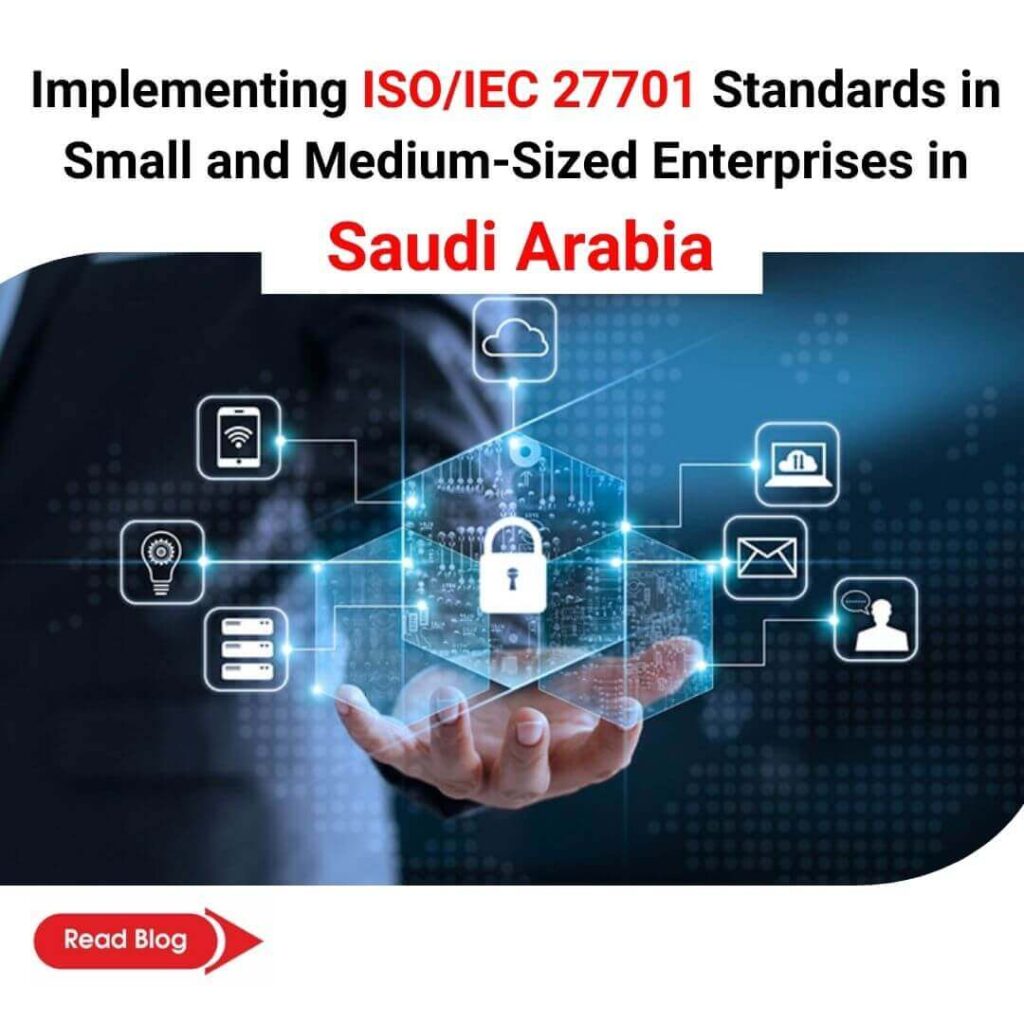
Introduction As Saudi Arabia pursues its ambitious digital transformation under Vision 2030, the significance of protecting personal data has never been paramount. As organizations increasingly rely on digital technology, the dangers of data breaches and cyber-attacks have grown. Navigating Saudi Arabia’s complicated terrain may be especially difficult for small and medium-sized firms (SMEs). Implementing ISO/IEC 27701 Privacy Information Management System (PIMS), an extension of the internationally renowned ISO/IEC 27701 standard, creates a strong foundation for protecting personal data protection. This article digs into the advantages, obstacles, and implementation techniques of ISO/IEC 27701 for Saudi SMEs, providing actionable ideas for improving data privacy policies. The Growing Need for Data Privacy in Saudi Arabia Saudi Arabia’s Vision 2030 is propelling essential technological and digital breakthroughs across a wide range of sectors. While the digital transformation has many advantages, it also raises serious issues about data security and privacy. The growing volume of personal data gathered, processed, and kept by corporations raises the danger of data breaches, identity theft, and cyber assaults. To address these concerns, the Saudi government enacted the Personal Data Protection Law (PDPL), which sets strict criteria for data management and protection. Compliance with the PDPL is critical for firms seeking to avoid legal ramifications and retain consumer trust. Adopting a comprehensive privacy management framework like ISO/IEC 27701 may be transformative for SMEs, who frequently face resource restrictions and insufficient expertise. What is ISO/IEC 27701:2019? is an international standard ISO/IEC 27701:2019 Privacy Information Management System (PIMS) that builds upon ISO 27001, which focuses on information security management. While ISO 27001 offers a framework for managing information security risks, ISO/IEC 27701 extends privacy management by addressing personal data protection. ISO/IEC 27701 :2019 Privacy Information Management System (PIMS) assists businesses in developing, implementing, maintaining, and constantly improving a Privacy Information Management System (PIMS). It outlines standards for managing personal data (Personally Identifiable Information, or PII) in accordance with both global best practices and local requirements. By incorporating ISO/IEC 27701 into their operations, small and medium-sized enterprises SMEs may improve their data privacy procedures and manage privacy concerns. Key Benefits of ISO/IEC 27701 Privacy Information Management System (PIMS) for SMEs in Saudi Arabia Regulatory Compliance Companies must ensure that they abide by local laws like the Personal Data Protection Law PDPL to ensure they do not end up in legal cases and consequences. ISO/IEC 27701:2019 enables SMEs to bring their data protection into conformity with these regulations and thus avoid hefty fines. Through compliance to ISO/IEC 27701, a firm can prove its conformity to data privacy and put a satisfactory safety check against regulatory non-compliance. Enhanced Data Protection ISO/IEC 27701:2019 can thus be used as a framework, giving an organized process of dealing with personal data privacy. What is even stipulated in the standard relates to controls and procedures to facilitate the identification, evaluation, and management of privacy risks. If implemented, SMEs can enhance their position concerning data protection, personal data security, and the overall risk of data breaches and cyberattacks. Building Customer Trust All businesses require trust especially where they conduct their operations in the digital platform to enhance data protection. This means that obtaining ISO/IEC 27701 certification makes a statement to customers, partners, and stakeholders that your business respects data privacy. It can also help to bolster your organisation’s image, reassure customers and help consumers to distinguish between businesses. Global Recognition ISO/IEC 27701 Privacy Information Management System (PIMS) is an international standard. Having this certification can help an SME to build a better image for its organization and this will help it to easily penetrate the international markets. Insofar as the Saudi companies aim at expanding their operations beyond the KSA borders, the ISO/IEC 27701 certification will give them a competitive edge by establishing compliance to global Personal Data Protection Act (PDPA) standards. Continuous Improvement ISO/IEC 27701 ensures constant improvement by having the aspects of review and update of the PIMS as a necessity. This is a continuous process that will guarantee that the SMEs are responsive to the emergent threats in privacy, alteration of laws as well as changes in the benchmark practices. Keeping data constantly up to date assists the businesses to avoid being caught up with certain risks while at the same time practicing sufficient measures in data privacy. Challenges of Implementing ISO/IEC 27701 Privacy Information Management System (PIMS) Even though ISO/IEC 27701 has several advantages, SMEs in particular may find the implementation process difficult. Typical difficulties include the following: Resource Limitations – It takes a substantial time, financial, and professional commitment to implement ISO/IEC 27701 . It might be difficult for SMEs to set aside the funds required for continuous maintenance, system updates, training, and documentation. This can be especially difficult for smaller companies that have tighter resources and fewer employees. Knowledge Deficits SMEs might not have the internal knowledge necessary to handle the complexities of ISO/IEC 27701 as privacy management is a complicated topic. This may make it more difficult to comply with regulations and properly manage privacy issues. It can be necessary for SMEs to look for outside consultants or training to fill up these knowledge gaps. Resistance Inside the Organization Successful implementation may encounter obstacles related to change management. New privacy policies may be opposed by staff members and management, particularly if they seem burdensome or superfluous to them. Getting support from all organizational levels is essential to getting over opposition and guaranteeing a seamless implementation process. Continued Maintenance ISO/IEC 27701 is a continuous endeavor rather than a one-time undertaking. SMEs must keep an eye on, evaluate, and update their Privacy Information Management System on a regular basis. To guarantee sustained compliance and efficacy, this continual maintenance can be resource-intensive and needs constant attention. Success Story Success story of SMEs in Saudi Arabia that have effectively adopted ISO/IEC 27701. These real-world examples demonstrate that this standard may help businesses of all sizes. TechSmart is a small IT services firm situated in Riyadh. They opted to implement ISO/IEC 27701 Privacy Information Management System (PIMS)
Elevating Business Excellence in the Gulf Cooperation Council (GCC) Region
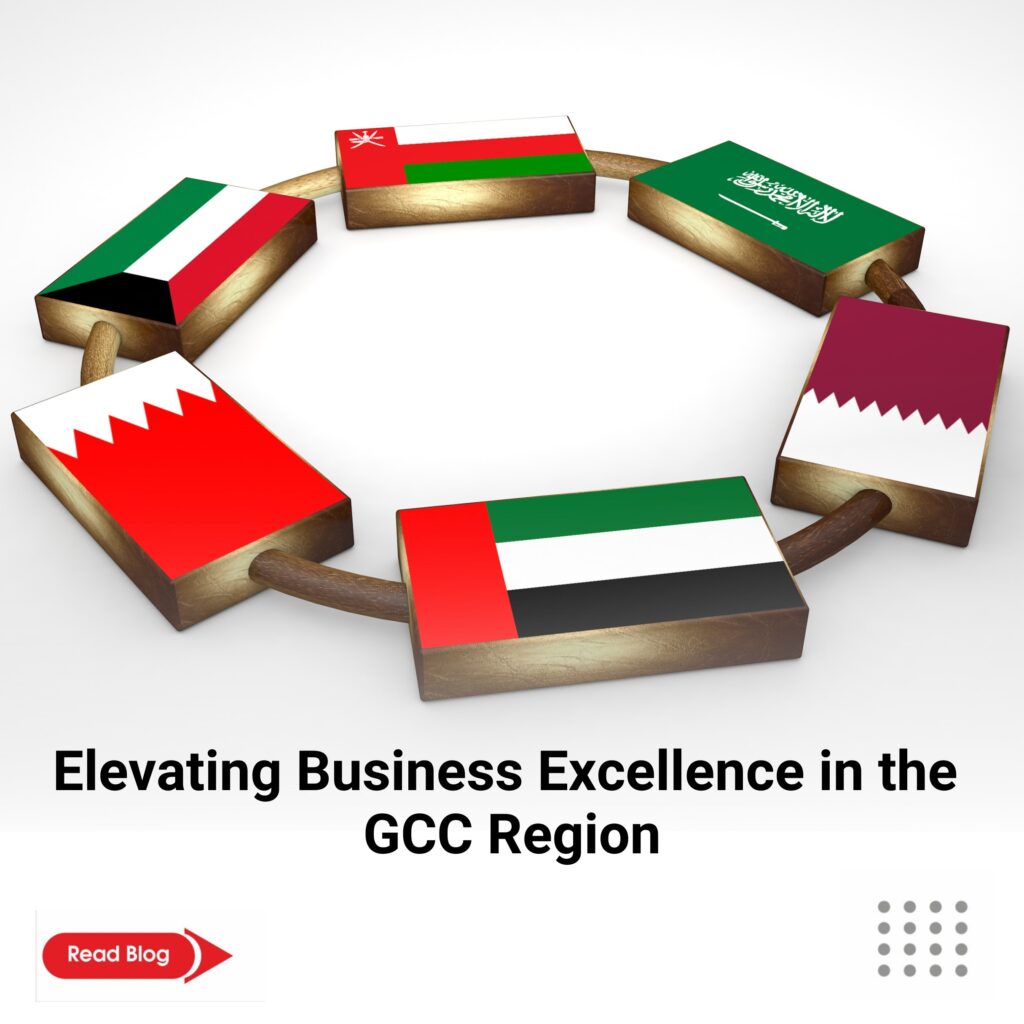
In the current world, getting an ISO certification is one of the measures towards success in implementing business excellence in the GCC region. The utilization of ISO standards as a road map of best practices to glide through the universally acclaimed executive procedures has floored the companies of the Gulf Cooperation Council (GCC) consequently rapidly rising operations and search for sustained enhancement. It’s noteworthy that severally ISO certification paints a plethora of benefits to the GCC based organizations. Evidently, to implement and comply with ISO requirements; firms gain competitiveness through optimizing process and management system to a higher degree of effectiveness and quality. This, in turn, enhances customers’ confidence quality and availability while creating new market opportunities and marketing the organization as a competent partner worthy of award of large contracts and strategic partners. Additionally, it also has the function of a driving force encouraging the constant improvement of various aspects in businesses from the Gulf Cooperation Council (GCC) ; lack of or suboptimal standardizations are revealed by ISO compliant businesses. It is therefore seen that the broad spectrum of activities and processes involved in ISO certifications provides organizations with strategies and methods for improving productivity and avoiding pitfalls as they strive to gain more ground on rivals. Due to the process of diversification and development of the GCC economies and increase in competition, the certification of the ISO has become one of the important trends for organizations, the main goal of which is to become a leader in their respective industries. So, by adopting these globally recognized standards, the companies located in Gulf Cooperation Council (GCC) can open up new opportunity areas for growth, work on their image improvement, and ensure the overall growth of the region’s economy. Advantages of ISO Certification to Gulf Cooperation Council (GCC) Businesses Enhanced Quality Assurance Obtaining ISO certification enhances the reliability of a business and its products in the eyes of consumers mainly those in United Arab Emirates (UAE) who view an ISO mark as a hallmark of quality. This certification helps to ensure that business organizations maintain standards that are acceptable in the international market hence improving on the quality of products and services which are key quality determinants that help to boost customers’ satisfaction and loyalty. Basically, while large corporations have the capital to continually undertake the modern and stringent standards, small businesses benefit from the standards as they create credibility and trust among the market audience. Regulatory Compliance Another benefit of ISO certification is that it plays a crucial part in promoting the organization’s compliance with relevant legislation of a particular country and worldwide norms. This is not only beneficial in preventing legal complications but also place the companies as corporate citizens. Furthermore, whenever there are regulatory, and legal Articles of Irish info security, ISO 27001 is essential to address the regulatory needs and put customer trust on the business’s capacity to shield data. Risk Management ISO standards have strong risk-management concepts. ISO 27001 assists enterprises in the digital industry in identifying possible vulnerabilities and implementing effective risk mitigation processes, therefore assuring business continuity and resilience. Similarly, ISO 22301 emphasizes that firms with this certification have tested and effective business continuity management strategies in place, which are critical for continuing operations during disruptions. Market Competitiveness It enables one to penetrate the current and new markets since many organizations require you to have an ISO standard to transact business with you or supply them goods and services. It also has a function of a unique selling proposition which help to set a business apart from its closest rivals. For a company competing in the global environment, this certification may often prove to be the critical point that will determine whether a company will get a contract and expand its business, because by receiving it, a company demonstrates it is ready to meet high international standards and provide the partners and customers with the highest level of service. Challenges in Obtaining ISO Certification Cost Implications The cost of obtaining ISO 9001 certification can be high, particularly for enterprises in the UAE and Saudi Arabia. Costs vary greatly depending on firm size, complexity, and the exact ISO standard being followed. In the UAE, costs range from a few thousand to several thousand dollars, which include consultant fees, audit fees, and continuous maintenance of the quality management system. Similarly, in Saudi Arabia, the overall cost might reach several lakh rupees, including gap analysis, internal audits, and consulting expenses. Time Commitment It usually months from the time of initial implementation to registration to obtain ISO certification, therefore it’s not an easy procedure. In accordance with the selected standard, this time is needed to create and operationalize the relevant procedures and processes. Businesses wanting faster certification to fulfil market needs may find the lengthy time commitment to be a significant problem. Training Requirements Personalized training that meets the unique requirements of the company is essential for achieving an ISO certification. Training programs in the UAE address diverse organizational roles, such as employees and managers, and cover a range of standards, including ISO 9001, ISO 14001, and ISO 27001. Even though it takes a lot of time and money to make sure every employee is properly trained, certification success and continuous compliance depend on it. Continuous Improvement ISO standards imply a commitment to continuous improvement, which requires ongoing updates and adjustments to processes and systems. This continuous need might be difficult since it demands organizations to continually invest in process improvements and employee training to increase quality and efficiency. Maintaining paperwork and records of training activities is also essential for showing compliance during audits. Case Studies of GCC Businesses with ISO Certification Success Story 1: ATS Awnings & Additions ATS Awnings & Additions, a notable company in the GCC, embarked on the journey to obtain ISO 9001 certification to enhance its operational excellence and market competitiveness. The process involved meticulous planning and implementation of quality management systems, which led to significant improvements in their operational
What is VAPT: A Complete Guide on VAPT
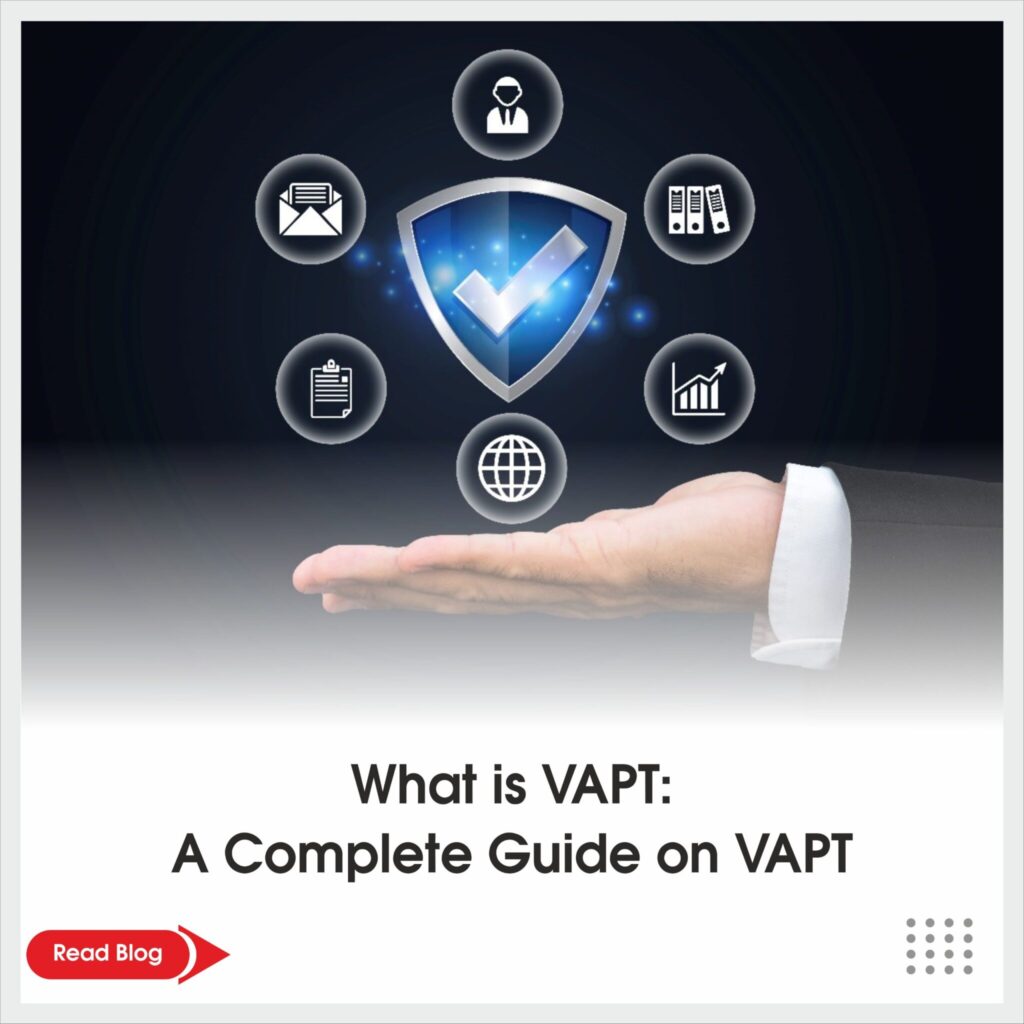
Introduction: Understanding What is VAPT and its Significance in Cybersecurity Cybersecurity has emerged as a major problem for businesses in a variety of sectors in the current digital era. Businesses now need to take strong precautions to protect sensitive data because cyber-attacks and data breaches are becoming more frequent. One such vital procedure is vulnerability assessment and penetration testing, or VAPT for short. This process is critical to guaranteeing the security of an organization’s IT infrastructure. VAPT is the process of using thorough assessments to find vulnerabilities in the systems, networks, and applications of a business. These evaluations are carried out by qualified cybersecurity experts who model actual attacks in order to find potential vulnerabilities that malevolent actors can take advantage of. Organizations can prevent cybercriminals from taking advantage of these vulnerabilities by proactively addressing them using VAPT. It is impossible to overstate the importance of VAPT in the field of cybersecurity. It gives businesses insightful information about their security posture and assists them in identifying areas that need to be addressed right away. VAPT is also frequently required by industry standards like ISO 27001 compliance and regulatory organizations, which makes it a crucial tool for companies trying to uphold data integrity and safeguard client confidence. A thorough analysis of the vulnerabilities discovered during the security test is provided in a VAPT report. Why Vulnerability Assessment and Penetration Testing (VAPT) is Crucial for IT Industries? Information technology industries need to give vulnerability assessment and penetration testing (VAPT) top priority when it comes to their security protocols because data breaches and cyber-attacks are becoming more common. Identification of potential flaws in a system or network that hackers could exploit is known as vulnerability assessment. The risk of data breaches and unauthorized access can be reduced by IT industries by regularly conducting assessments to proactively detect and resolve vulnerabilities before they are exploited. By mimicking actual attacks, penetration testers go beyond assessment and determine how well-functioning the current security measures are. Organizations are able to fortify their defenses and reduce any dangers by using this approach to find any weaknesses in network security. Implementing VAPT preserves an organization’s reputation in addition to protecting sensitive data. A solitary breach of data can result in dire outcomes, such as monetary detriment, harm to the reputation of a brand, and legal ramifications. Businesses show their dedication to preserving consumer trust and protecting customer information by investing in thorough IT security evaluations. Furthermore, companies frequently need to perform routine VAPT evaluations in order to comply with industry laws like the GDPR (General Data Protection Regulation), ISO 27001, CMMI, SOC-1, and SOC-2. There may be severe fines and legal repercussions for breaking these rules. Benefits of VAPT testing for Industries In the subject of cybersecurity, particularly within IT enterprises, vulnerability assessment and penetration testing (VAPT) are crucial elements. Here are some key benefits: Practical Experience: Practical, hands-on exercises and laboratories that mimic real-world events are frequently included in VAPT certification programs. This gives you the opportunity to practice employing different security tools and strategies successfully. Risk Assessment: VAPT offers a thorough evaluation of the possible effects that exploits might have on the system. By concentrating on high-risk vulnerabilities, it can help prioritize security efforts. Constant Learning and Adaptability: VAPT certification promotes continual learning and adaptation to new security problems and technology. Cyber threats are always changing. It gives you the abilities to keep ahead of new dangers. Prevention of Financial Loss: Due to data breaches, ransomware attacks, etc., cyberattacks can cause substantial financial loss. Such situations can be avoided through VAPT, protecting the company from significant financial loss. Improved Career Opportunities: Having a VAPT certification can help you get access to fascinating cybersecurity career options. Specialized certificates such as VAPT are highly valued by organizations when hiring for security analyst, penetration tester, ethical hacker, and security consultant positions. Creation of Security Awareness: Additionally, VAPT aids in instructing the organization’s workforce about the significance of security precautions and how to react in the event of a breach. Business Continuity Enhancement: Businesses can avoid disruptions brought on by cyberattacks, ensuring smooth operations and business continuity, by discovering and addressing vulnerabilities. Decision Making: The thorough reports produced by VAPT offer insightful information that helps guide decisions regarding IT investments and security protocols. Since new vulnerabilities might develop over time as technology and threat landscapes change, VAPT should be a continuous process rather than a one-time occurrence. ISO standards applicable to the IT industry ISO 9001 Quality Management Systems (QMS) – ISO 9001 helps in the implementation of a quality management system in an organization. This standard can be applied to any organization irrespective of the sector that they belong to. For IT industries, it helps in ensuring the quality of services. ISO 14001 Environmental Management Systems (EMS) – Every industry, including the IT sector, is required to demonstrate its commitment to a sustainable environment. For that purpose, ISO 14001 certification can act as proof of your commitment towards the environment as well as compliance towards related regulations. ISO 45001 Occupational Health and Safety Management System (OH&SMS) – The occupational safety of the employees has a direct relation with productivity. With ISO 45001 certification, an IT company can demonstrate its commitment to providing a safe work environment for its staff. ISO 27001 Information Security Management System (ISMS) – ISO 27001 standard helps in the implementation of Information security management systems that ensure the safety and privacy of data stored within the organizations. The IT sector deals with a huge amount of online data that needs to be protected against any breach or loss. ISO 22301 Business Continuity Management System (BCMS) – This standard helps in the implementation of a Business Continuity Management System in an organization and helps them in identifying and eliminating any risk that can affect the continuity of business. ISO 27701 Privacy Information Management System (PIMS) – This standard is a data privacy extension of ISO 27001 certification and helps organizations with their GDPR compliance. It is also called PIMS (Privacy Information Management System) and it sets a framework for Personally
Complete Guidance for GDPR Certification
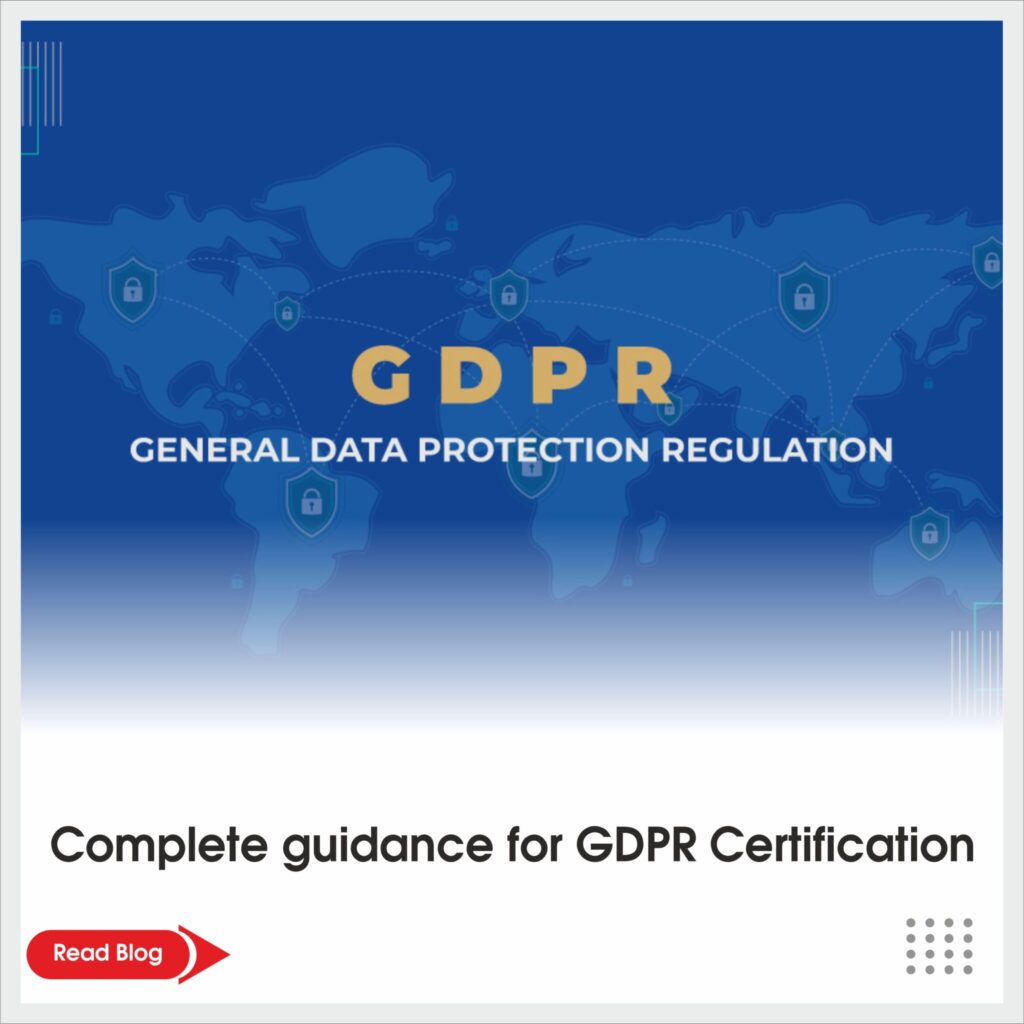
General Data Protection Regulation (GDPR) certification helps businesses, meaning they protect European citizens from data loss due to cyber-attacks, terrorism, unethical business practices, etc. GDPR is a required compliance action to do business in the EU or deal with data of citizens from the EU. What is GDPR certification? The General Data Protection Regulation (GDPR) is a legal framework that sets guidelines for the collection and processing of personal information from individuals who are residing in the European Union (EU) and outside. General Data Protection Regulation (GDPR) was passed in the European Parliament in 2016 and put into effect in May 2018. GDPR is the world’s toughest security and privacy law. It aims to provide consumers control of their personal data by holding organizations responsible for the way they handle and treat this information. The GDPR rules apply nevertheless of which website they are based on. Importance of GDPR certification With quickly growing cybercrime and data threats, it is very important to consider the GDPR certification for businesses. The increasing number and nature of cyber-crime and data violations has put the industry alert. At present, businesses have been investing to safeguard their customer’s important and personal information. GDPR or General Data Protection Regulation Certification is one of the best solution providers to protect data from cyber-attacks, threats, etc. It provides many benefits with optimal data protection solutions. The major benefits of the General Data Protection Regulation (GDPR) include improved accountability and safeguarding their client data. Key principles of GDPR Certification Seven key principles in GDPR certification are mentioned below; Lawfulness, fairness, and transparency Purpose limitation Data minimization Accuracy Storage limitation Integrity and confidentiality Accountability Lawfulness, fairness and transparency: Processing secret data should be done lawfulness, fairness, and transparency. An individual should be informed how their data is used. Purpose of limitation: Personal data should be collected only for lawful purposes. Data minimization: Personal data must be limited to what is needed for the stated goal. Accuracy: Ensuring that secret data is corrected and up to date is important. Whenever it needs the data should be corrected or deleted without delay. Storage limitation: To achieve the intended purpose personal data should be Kept only as long as needed due to Storage limitations. Integrity and confidentiality: It is very important to ensure that personal data is processed securely, it safeguards against unauthorized access or destruction. It is essential to take the required activities to protect personal data from a possible risk that may compromise its confidentiality, integrity, or availability. Accountability: Companies should acknowledge their data operational activities and show their adherence to the GDPR. Five Key Benefits of GDPR certification are 1. Enhanced data protection2. Improved customer trust and transparency3. Compliance and avoidance of penalties4. Strengthened security measures5. Competitive advantage Enhanced data protection: More focus on data protection helps the business to maintain the privacy and confidentiality of important data. Improved customer trust and transparency: Transparency is an important feature of GDPR. The regulation commands that the business to be clear and transparent about collecting, saving, and processing personal data. This increased transparency nurtures trust between businesses and their clients. Compliance and avoidance of penalties: This GDPR certification avoids penalties to safeguard the personal data of their client. GDPR certification is essential not only for maintaining client trust but also it avoiding significant penalties. Therefore, if your company is not compliant, it can result in huge penalties. Strengthened security measures : GDPR implements robust security measures to protect personal data. Businesses need to assess and upgrade their security protocols constantly ensuring data confidentiality, integrity, and availability. Competitive advantage: Conformity with this framework can offer a competitive advantage in business. By demonstrating a commitment to protect client data and privacy, businesses can differentiate themselves from competitors. This process increases client loyalty and trust. Objectives of GDPR certification Data Protection : To standardize and robust data protection law in the European Union for secure and lawful individual data processing. Notification of Data Breaches : To need Timely reporting of data breaches to authorities and affected individuals. Consent : To establish precise needs for receiving and managing individuals’ consent for data processing. Data Portability : To allow individuals to quickly move their data from one service provider to another provider. International Data Transfer : To ensure enough protection, regulate the transfer of personal data outside the European Union and EEA. Conclusion ✅ GDPR helps the customer or client to safeguard their personal or business data. The Business obtains several benefits from implementing GDPR certification. Businesses can establish themselves as responsible and trustworthy organizations in the modern digital environment by embracing and prioritizing data protection.
PCI DSS Compliance: Why It Matters More Than Ever in Today’s Digital World
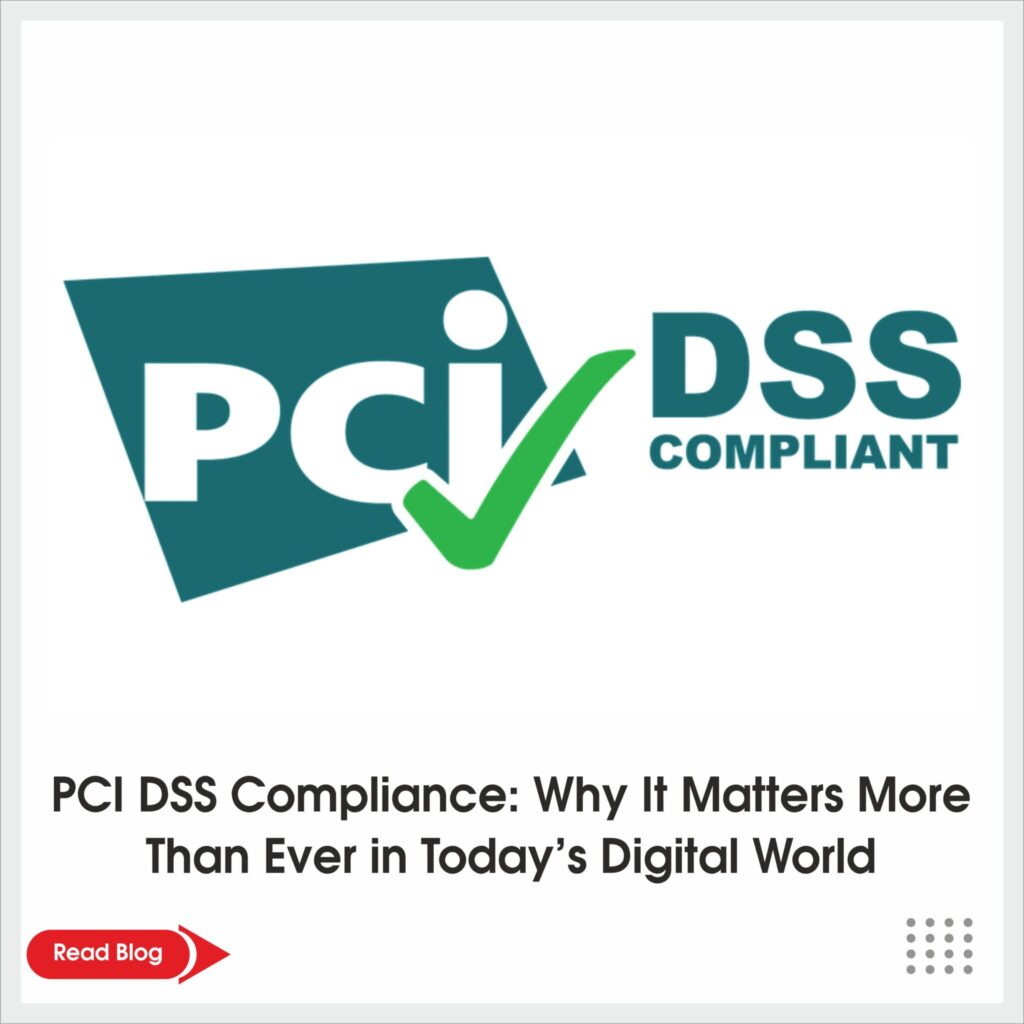
The Payment Card Industry (PCI) Data Security Standard (DSS) is an information security standard designed to improve cardholder data security for companies that store, handle, or transfer credit card information. Its major goal is to decrease cardholder information susceptibility and credit card theft by tightening controls over how cardholder data is kept, processed, and sent. Retailers, retail branches of any firm in any industry, online payment services, banks that issue credit cards, and service providers that offer online cloud payment processing are examples of organizations that keep cardholder environment data. Who is subject to the PCI DSS? The PCI DSS applies to all businesses, regardless of location, size, or transaction volume. These requirements apply whenever the firm is involved in the payment process by receiving, transmitting, or keeping credit card information. Failure to comply with PCI DSS requirements leads to a fee or potentially the loss of your company’s ability to take credit cards. What are the main goals of PCI DSS compliance? This aspect makes PCI compliance an important element in the running of an online business. The reason is simple. PCI-DSS standards offer the most comprehensive advice that can guide the process of securing such data and customer information. Inadequate data security is costly. As reported by IBM, the cost of a breach is approximately $4. 35 million. There is no doubt that strong PCI compliance can help companies avoid significant risks related to data loss. This does not only help to reduce financial losses as a result of attacks, but as well. Compliance also serves as an effective shield against the negative impact that the organization’s reputation may be subjected to. And it minimizes the chances of federal prosecution for putting data on the line. PCI compliance addresses the root causes of most breaches that result in the loss of data. These are: – Other insecure payment processing devices like in-store readers. Digital cardholder data environments. If there are paper financial records of card data, they should also be returned. Security devices such as CCTV or other recording equipment that capture credit card information. Unsecured network access points. The advantages of putting PCI DSS Compliance into practice Adopting PCI-DSS compliance requirements has several advantages for the company, ranging from improving overall security posture and safeguarding against data breaches to preventing customer attrition and financial penalties. Optimizing security posture and improving operational efficiency are achieved by using robust cryptography and security measures together with best practices. Additionally, it promotes a compliance culture and aids in proactive risk management. Many big businesses look for providers who comply with PCI. Therefore, it facilitates commercial corporation expansion. Clients may easily mortgage their faith in the company with compliance assurance. They are aware that their data is handled safely and securely. It is possible to prevent the financial consequences of non-compliance or breaches, such as fines, penalties, litigation, etc. The majority of people remain unaware of the rules that govern PCI compliance and have no idea about penalties for non-compliance. Even though PCI is not the law, this doesn’t mean that being out of compliance is not important. A Verizon Data Breach Incident Report that was conducted in 2015 discovered that there were approximately 79, 988 data security incidents this year. Therefore, your payment processing life cycle has to be more secure than ever. If you are non-compliant with the PCI standards of your business, then you are vulnerable to data breaches, fines, replacement of cards, expensive forensic audits and investigations concerning your business, damage to the brand of the business, and more in case of a breach. However, 30% of the small businesses surveyed said they have no idea of the consequences when they fail to implement PCI DSS 3.0. Punishments are not widely advertised but they are devastating to organizations. How does PCI DSS compliance work? The PCISC is the governing body that oversees PCI compliance. The PCI Security Standards Council maintains a document library that holds the current regulatory standards on PCI. This library also offers “at a glance” digests, quick reference guides, and updates on recent changes. PCI regulations work in the way that checklists work. Companies benchmark their security program with PCI-DSS guidelines. And they make changes based on these recommendations. This process usually takes a three-stage format: Assessment – The general assessment of the cardholder data environment. Any device or application that processes credit card information has to be included in the lists. They need to follow the PCI specifications to determine risks that may compromise cardholder data. Mitigation – There are controls that organizations must implement to ensure compliance with PCI-DSS on the internal security systems. Documentation – Any alteration made within the organization needs to be recorded and reported with the purpose of standardizing the systems in compliance with the PCI-DSS. This will also serve as supporting documents that the organization is in line with contemporary security requirements. Core principles of PCI DSS compliance Six fundamental PCI-DSS principles are applied in the majority of PCI compliance procedures. The most significant information security challenges are encapsulated in these ideas. They assist companies in concentrating on what matters by demystifying a difficult problem. First principle: Network security One of the most important aspects of credit card data security is network edge protection. Software upgrades, firewalls, and threat detection systems protect against malicious software and outside intrusions. Second Principle: Data protection Information about cardholders should be recorded and kept safe. Apart from other network resources, customer data should be kept. Furthermore, all vital data should be encrypted by security specialists. Third principle: Ongoing vulnerability managementEstablishments ought to evaluate possible weak points. Malware scanners and antivirus software are only two examples of the many technologies that security teams should use. Also, everyday data security responsibilities must incorporate PCI regulations. Fourth principle: Access controlOnly authorized and verified users should have access to cardholder data. Manage access by implementing role-based controls and removing privileges as necessary. Restricting physical access to devices containing cardholder data may also be necessary in this situation. Fifth Principle: Security testingPenetration testing
What is ISO 22716 GMP for Cosmetics?

ISO 22716 is a comprehensive set of GMP requirements for the cosmetics and personal care sector introduced in 2007. Cosmetics are commodities or materials designed to improve, cleanse, or change a consumer’s face or body, such as cosmetics, oral care products, lotions, deodorants, hair products, and scents. The ISO is a globally known non-governmental organization that develops standards for various businesses. In 2007, the International Cooperation on Cosmetic Regulations (ICCR), which was founded by the United States (US), Canada, the European Union (EU), and Japan, agreed that this standard would be used to suggest or publish cosmetic GMP standards for each country. Why ISO 22716 is Crucial to Cosmetics? ISO 22716 is a quality and management system that encompasses the entire beautification process, ranging from production to control, storage, and transportation of products including buying raw materials, components as well as packaging material. Cosmetics are any substances applied to the face or body that are intended to beautify, cleanse, or change the colour, texture, smell, or taste of a user via make-up, creams, deodorants, hair products, and fragrances. Thus, makeup products are made from a mixture of chemical components built from natural substances or synthetic ones. In the USA, the Food and Drug Administration (FDA), is the regulatory agency of the FDA. The Food and Drug Administration (FDA) determines cosmetics as those “that are specifically intended to be used on the human body for cleansing, beautifying, promoting attractiveness, and altering the appearance without affecting the body’s structure or functions”. Advantages of having ISO 22716 GMP in your organization Lower liability risk: Certification enables you to demonstrate that you have taken all reasonable precautions to guard against or rectify mistakes and to preserve your legal rights. Enhanced trust among partners and customers: By obtaining certification, you can show your partners and customers that you have complied with regulatory requirements and establish your reputation as a reliable supplier of high-quality, safe cosmetic goods. Supply chain management: The certification of ISO 22716 offers reliable proof that you have examined and assessed the safety and quality protocols through the supply chain of your cosmetic goods. Enhanced business efficiency: By streamlining production procedures, you may accomplish your objectives faster and with more dependability. EU Cosmetics GMP Requirements GMP, or good manufacturing practice, requirements for cosmetics form the core of the EU Regulation on Cosmetics. This law, intended to safeguard consumer safety, imposes stringent requirements on all European and non-European parties engaged in the supply chain of cosmetic products. Despite these legal requirements, all cosmetic products manufactured in the EU have to follow the ISO 22716:2007 standard’s Cosmetics Good Manufacturing Practices. Proof that the items are created by ISO 22716 can be provided by the ISO 22716 certificate or a declaration attesting to that fact. The following enumerates the domains for which ISO 22716:2007 stipulates certain requirements, together with their principal guidelines :- Employees: employees should possess the necessary training to manufacture, oversee, and keep goods of a certain caliber. Premises: The location, layout, design, and use of the premises should guarantee product protection; allow for effective cleaning, sanitizing, and maintenance as needed; and reduce the possibility of product, raw material, and packaging unit mix-ups. Equipment: For equipment to be utilized for its original function, it must be able to be maintained, cleaned, and sanitized as needed. The equipment must be calibrated regularly in addition to being appropriately installed and cleaned. It should only be accessible and used by those who have been granted permission, and there should be enough backup procedures in place. Raw materials and packaging materials: raw materials and packaging materials that are purchased should meet defined acceptance criteria (physical, chemical, and microbiological) relevant to the quality of finished products. There should be proper measures and criteria in place for purchasing, receipt, identification and status, release, storage and re-evaluation of raw materials. The quality of water used in production should also be controlled. Production: steps should be performed at every level of the production and packaging processes to ensure that the final product has the specified qualities. Final products: The manufacturer must make sure that the products fulfil the specified acceptance criteria and are regulated using the approved test procedures before releasing them into the market. To preserve the quality of the final goods, care must be taken during storage, shipping, and return processes. Laboratory for quality control: The same guidelines that are outlined for staff, space, tools, subcontracting, and paperwork should also be applied to the lab. For materials to be released for use and products to be released for shipment, only when their quality meets the necessary acceptance criteria, the quality control laboratory must make sure that all relevant and necessary controls are carried out within its activity concerning sampling and testing. It is necessary to establish how a product that does not meet specifications is treated. Wastes: They need to be disposed of promptly and hygienically. Subcontracting: When it comes to subcontracting operations, a formal contract that is established, mutually confirmed, and controlled by both the contract giver and the contract acceptor is required. Deviations: Corrective action should be conducted after deviations have been found and enough data has been gathered about them. Recalls and complaints: The factory should evaluate, look into, and follow up on any concerns about the items that have been brought to their attention. Upon decision-making regarding a product recall, the necessary actions ought to be conducted to conclude the recall and execute the corrective measure. The procedure for handling complaints in contracted operations should be agreed upon by both parties. Change control: authorized staff must approve and carry out modifications that may have an impact on the product’s quality and do so only after gathering enough information. Internal audit: GMP implementation and status should be kept track of. Corrective measures should be suggested if needed. Documentation: An essential component of GMP is documentation. Depending on its organizational structure and product offerings, every business should have its document management system created, planned, implemented, and maintained. To
Unlocking Excellence in Education: Understanding ISO 21001:2018 and its Benefits

ISO 21001 is an international standard developed by the International Organization for Standardization (ISO) that provides management tools for organizations that offer educational products and services. It aims to help educational providers meet students’ requirements and needs. The standard was first published in 2018 and is applicable to all organizations involved in the educational sector, such as schools, universities, distance learning centres, corporations, and non-profit or governmental organizations. The ISO 21001 standard is based on the ISO 9001 Quality Management Systems standard but is tailored specifically for the educational sector. It includes a set of guidelines and principles that focus on the specific needs and challenges of educational institutions, with an emphasis on enhancing the satisfaction of learners and other beneficiaries. Understanding ISO 21001:2018 Educational Organizational Management System (EOMS): The standard establishes an Educational Organizational Management System (EOMS) to ensure that the organization can consistently provide a product that meets the learner’s and other beneficiaries’ needs. Quality and Competence: ISO 21001 emphasizes quality education and competence. It ensures that educational organizations are competent in providing effective learning opportunities. Inclusivity: The standard promotes inclusivity by encouraging educational organizations to understand and respond to the diverse needs of their learners. Life-long Learning: ISO 21001 supports the concept of lifelong learning, recognizing that education is not confined to traditional classroom settings or specific periods in a person’s life. The key benefits of implementing ISO 21001:2018 Improved Educational Processes: By implementing the standard, educational organizations can streamline their processes, making them more efficient and effective. This can lead to improved educational outcomes. Enhanced Learner Satisfaction: The standard focuses on meeting the needs and expectations of learners. As a result, learner satisfaction can be enhanced. Increased Credibility: Being certified to ISO 21001 can increase an organization’s credibility in the eyes of stakeholders, including learners, parents, governmental bodies, and potential partners. Risk Management: The standard helps educational organizations identify and manage risks associated with their activities, thus ensuring a safer and more secure learning environment. Inclusive and Equitable Quality Education: ISO 21001 supports the United Nations Sustainable Development Goal 4 – to ensure inclusive and equitable quality education and promote lifelong learning opportunities for all. ISO 21001 implementation in your educational centre can turn regulatory requirements into the source of the constant development of students as well as the surroundings of the institution. If you follow a detailed directive, you reduce the time needed for start-up and guarantee that you comply with the established requirements for your organization. Start with an introduction in the ISO 21001 which includes its (ISO 21001) requirements. Under this international standard, the schools are concerned, and the framework is developed on the fundamental approach for the design, implementation, operation, and improvement of the educational organisational management system (EOMS). With the knowledge of the main ideas and aims of the ISO 21001 standard, one will have the ground to build the entire structure on. Thus, check your institution’s current practices versus the criteria of ISO 21001. Establish whether there is any gap or necessity for improvement this shortcoming should be corrected. This assessment will be your primary tool in identifying the incentives and assistance required to ensure the success of the implementation. Now that you have ascertained your deficiencies, figure out your action plan. The suggested plan should explicitly declare concrete actions, assign a person responsible, set deadlines, and identify milestones structured in a manner that will help you through the process. It is pertinent to include all the stakeholders comprising the administration, teachers, and staff in the planning phase of ISO 21001 so that everyone is in the same wave of the organization. Make fund placement available for implementation. Financial resources as well as human resources should be part of these resources to ensure a successful outcome. Employees will need to be trained with the nature of their position and the EOMS framework into which they belong. Moreover, there is a need to adopt the technology or the software proposed which can assist the data entry and documentation procedures required for ISO 21001. Effective communication in the whole implementation process is of great significance. Be sure that all the stakeholders understand the overall purpose of and the advantages of implementing ISO 21001. Continuously provide them with the updates on the progress, and respond promptly to their questions and concerns as the journey goes on. Furthermore, keep an eye on and assess your organization’s progress toward achieving ISO 21001 compliance on a continual basis. To verify that the standard is being followed, internal or external certifying organizations should do routine audits. You may establish a culture of continuous improvement and provide your students access to a top-notch learning environment by using this step-by-step guide to apply ISO 21001 at your educational institution. Educational establishments can achieve excellence in education by comprehending and putting into practice ISO 21001, offering top-notch learning opportunities that satisfy the various demands of every student.
ISO 41001:2018 Certification: Elevating Facility Management Systems to New Heights
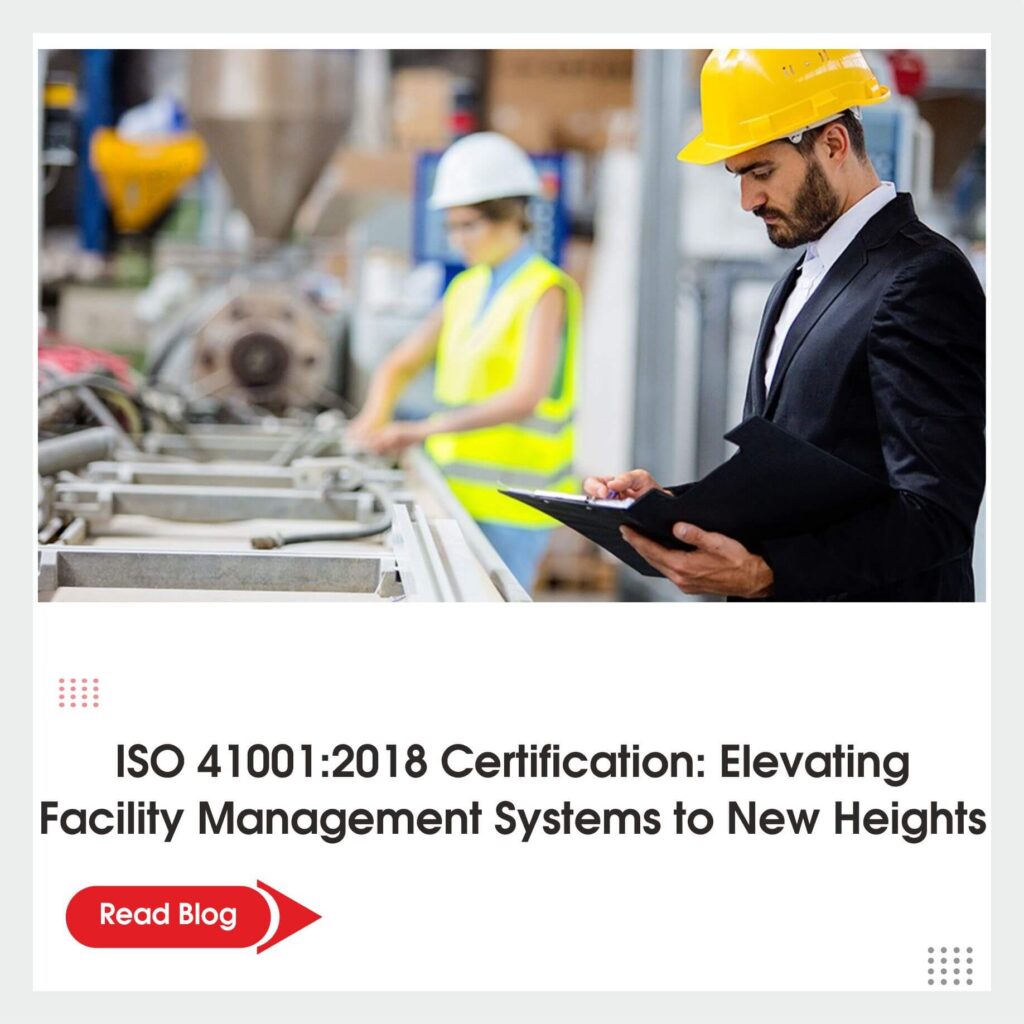
The ISO 41001:2018 certification process becomes a way of ensuring efficient and effective operation of the facility management structures. This globally acknowledged benchmark serves as the touchstone of best practices in managing facilities, not only focusing on efficiency but also sustainability and safety as well. A facility manager who follows the standards of ISO 41001, shows a clear sign of being a professional who practices excellence and constantly strives to improve their operations. Through this conciliation, enterprises will be able to improve their image, simplify their processes, and fulfil the law’s requirements with maximum effectiveness. Implementing ISO 41001 standards is necessary for office management practices to take the operations up to the desired excellent level and bring satisfaction to the occupants and other stakeholders. ISO 41001:2018 facility management provides a cutting-edge stage for industries to examine whether their management systems meet the benchmark of effectiveness and affordability. Furthermore, it teaches the update of the system, the flourish of the working process, and the stick to legal rules. By implementing ISO 41001:2018, industries can assign value to their work, for instance, high-quality products and services to their clients besides increased operation efficiency and cost-reduction. It has proved to be a very useful tool for any organisation looking to excel in Global facility management such as more advanced management operations, by the scope of the industry. The use of this standard will offer numerous advantages for industrial projects, for instance, productivity and resource management will be improved, information and command will be clear, and customer satisfaction will be provided. The Steps that Need to be Taken during ISO 41001 Certification ⮯ Through the steps which are provided below, the organization will systematically acquire and retain ISO 41001 certification to indicate dedicated effort in facility management practices. Step 1: Make sure you have a good command of the ISO 41001 basic concepts. Soak up the knowledge of the ISO 41001 and the principles of the Facility Management Systems (FMS) that it articulates. See its function, limitations, and the potential utility it will bring to your company. Step 2: Develop Backing and Support Leadership buy-in of top management level to support the ISO 41001 certification implementation. It is in this way that you can favor the allocation of funds and leadership positions in the Facility Management System. Step 3: Compile a Gap Analysis Establish your baseline—compose lists that go through your operations and match them with the relevant ISO 41001 standard requirements. Enumerate activities that your company is already in line with and possible innovations that the standard may demand to comply with. Step 4: Develop a scheme. Compose a specific plan which includes exactly the series of events of your organization implementing ISO 41001 standards. Create a job description and task division to make a management structure relevant to the project, and to make it organized and hierarchical. Step 5: Generate the Set-up Standardized Procedures Display the key processes and procedures required by ISO 41001. This will comprise a manual that describes the overall FMS structure and how it is aligned with the standard. Step 6: Training and Awareness of the Workers Train employees about the new FMS procedures and point out to them how their roles in ensuring compliance are very crucial. This move will be a guarantee that all the people in the group should be aware of their roles. Step 7: Order the FMS. Integrate what has already been documented into practice. This ranges from preventive activities such as generating an FMS maintenance plan and conducting emergency evacuation drills to ensuring consistent compliance with ISO 41001 requirements. Step 8: Conduct Management Audits Do regular internal audits to find any nonconformities as well as areas that will require you to improve over time. This measure greatly helps to sustain the necessary level of compliance for certification auditing by third-party external auditors. Step 9: Corrective Actions All discrepancies or variances noted from internal audits should be resolved. Fix those issues and adopt corrective actions for the improved Facility Management System. Step 10: Select an Accredited certification Body. Choose the qualifying and certified body for outside auditing. Make sure they are acclaimed with knowledge of ISO 41001 accreditation. Initiate agreement and proper preparations for the certification audit with them. Step 11: Undergo External Certification Audit. The certification body will carry out a comprehensive audit of your FMS to check that it fulfils the standards prescribed by ISO 41001. Show the positive results of your system as well as identify any issues. Step 12: Continual Improvement After achieving ISO 41001, work systematically at improving the overall management of the organization. Routinely modify and expand your FMS to support organizational modifications and to comply with the standard. The Impact of ISO 41001 on Sustainability and Environmental Responsibility in Facility Management ⮯ ISO 41001, or the facility management system standard, is a revolutionary step, which is mainly dedicated to facilities management study. This standard is disrupting the traditional way of managing the facilities to ensure a more sustainable and environmentally friendly future for our planet as its goal is not simply to maintain, but to elevate the state of environmental responsibility and sustainability. Sustainability is one of the core aspects of ISO 41001 that encourages its adoption. This standard is stipulated to urge facility administrators to adopt the methods of sustainability that lead to reduced waste, conserved energy, and ultimately fewer green impacts brought about by the operations. As a result, waste facilities will have more energy-efficient systems and should switch to renewable energy sources whenever available and should incorporate into their programs recycling and waste reduction. The incredible influence of sustainable well-practiced practices must be emphasized. They will give back to the world, on top of that, being a long-term gain financially to the businesses. Beyond that, ISO 41001 gives a great deal of weight to the substance of nature. The operation managers are now challenged to evaluate how the decisions they make are affecting the environment in which their business operate. This is going
Elevate Your Cosmetic Brand with ISO 22716 GMP Standards

The ISO 22716:2007 standard considers the unique requirements of the cosmetic industry and has been designed for their consideration. The manufacturing, supervision, packaging, and distribution of cosmetics are the main topics of the standard. These recommendations include technical, administrative, and human resource management guidance that is both organized and useful in enhancing the quality of the final output. ISO 22716:2007 Good Manufacturing Practices in Cosmetics focuses on human, technological, and administrative elements that particularly impact product quality and contains a variety of applied consultation, working rules, and operational regulations. The goal of the ISO 22716:2007 standard is to identify actions that lead to an end product that fulfils the specified criteria, and hence product safety. Cosmetic producers can also be assured of satisfying international safety standards by adhering to ISO 22716. Demonstrating conformity with regulatory requirements across different markets, not only benefits the end-users but also promotes commerce. Importance OF ISO 22716:2007 Good Manufacturing Practice (GMP) ⮯ The International Organization for Standardization created Good Manufacturing Practices (GMP), which gives a comprehensive manual for the secure manufacture of cosmetics. ISO 22716:2007 standard was created and is being used by many countries. Under the headline, TS EN ISO 22716 Cosmetics – Good Manufacturing Practices (GMP) – Guidance on Good Manufacturing Practices, the Turkish Standards Institute (TSE) launched it in our nation. The ISO 22716:2007 standard describes a comprehensive quality management system strategy that covers the manufacturing, testing, packing, storing, and shipping of finished cosmetic goods. The ISO 9001 Quality Management System and the ISO 14001 Environmental Management System easily integrate with this standard. Advantages of Cosmetics Manufacturing Practices Under ISO 22716:2007 Good Manufacturing Practice (GMP)⮯ Ensure that the basic operational and environmental conditions needed to generate safe products are met by best industry practices. Make high-quality goods that are acknowledged and embraced globally. Obtain a competitive advantage over other market players. Make ensuring that products are safe for consumers to utilize. Naturally, businesses become more efficient in their operations as their expenses go down. EU COSMETICS GMP REQUIREMENTS ⮯ GMP, or good manufacturing practice, requirements for cosmetics form the core of the EU Regulation on Cosmetics. This law, which is intended to safeguard consumer safety, imposes stringent requirements on all European and non-European parties engaged in the supply chain of cosmetic products. Despite these legal requirements, all cosmetic products manufactured in the EU have to follow the ISO 22716:2007 standard’s Cosmetics Good Manufacturing Practices. Proof that the items are created by ISO 22716 can be provided by the ISO 22716 certificate or a declaration attesting to that fact. The following enumerates the domains for which ISO 22716:2007 stipulates certain requirements, together with their principal guidelines: Employees: employees should possess the necessary training to manufacture, oversee, and keep goods of a certain calibre. Premises: The location, layout, design, and use of the premises should guarantee product protection; allow for effective cleaning, sanitizing, and maintenance as needed; and reduce the possibility of product, raw material, and packaging unit mix-ups. Equipment: For equipment to be utilized for its original function, it must be able to be maintained, cleaned, and sanitized as needed. The equipment must be calibrated regularly in addition to being appropriately installed and cleaned. It should only be accessible and used by those who have been granted permission, and there should be enough backup procedures in place. Raw materials and packaging materials: raw materials and packaging materials that are purchased should meet defined acceptance criteria (physical, chemical, and microbiological) relevant to the quality of finished products. There should be proper measures and criteria in place for purchasing, receipt, identification and status, release, storage and re-evaluation of raw materials. The quality of water used in production should also be controlled. Production: steps should be performed at every level of the production and packaging processes to ensure that the final product has the specified qualities. Final products: The manufacturer must make sure that the products fulfill the specified acceptance criteria and are regulated using the approved test procedures before releasing them into the market. To preserve the quality of the final goods, care must be taken during storage, shipping, and return processes. Laboratory for quality control: The same guidelines that are outlined for staff, space, tools, subcontracting, and paperwork should also be applied to the lab. For materials to be released for use and products to be released for shipment, only when their quality meets the necessary acceptance criteria, the quality control laboratory must make sure that all relevant and necessary controls are carried out within its activity concerning sampling and testing. It is necessary to establish how a product that does not meet specifications is treated. Wastes: They need to be disposed of promptly and hygienically. Subcontracting: When it comes to subcontracting operations, a formal contract that is established, mutually confirmed, and controlled by both the contract giver and the contract acceptor is required. Deviations: Corrective action should be conducted after deviations have been found and enough data has been gathered about them. Recalls and complaints: The factory should evaluate, look into, and follow up on any concerns about the items that have been brought to their attention. Upon decision-making regarding a product recall, the necessary actions ought to be conducted to conclude the recall and execute the corrective measure. The procedure for handling complaints in contracted operations should be agreed upon by both parties. Change control: authorized staff must approve and carry out modifications that may have an impact on the product’s quality and do so only after gathering enough information. Internal audit: GMP implementation and status should be kept track of. Corrective measures should be suggested if needed. Documentation: An essential component of GMP is documentation. Depending on its organizational structure and product offerings, every business should have its document management system created, planned, implemented, and maintained. To avoid information loss, misunderstanding, etc., the documentation’s goal is to define the specified GMP activities.
